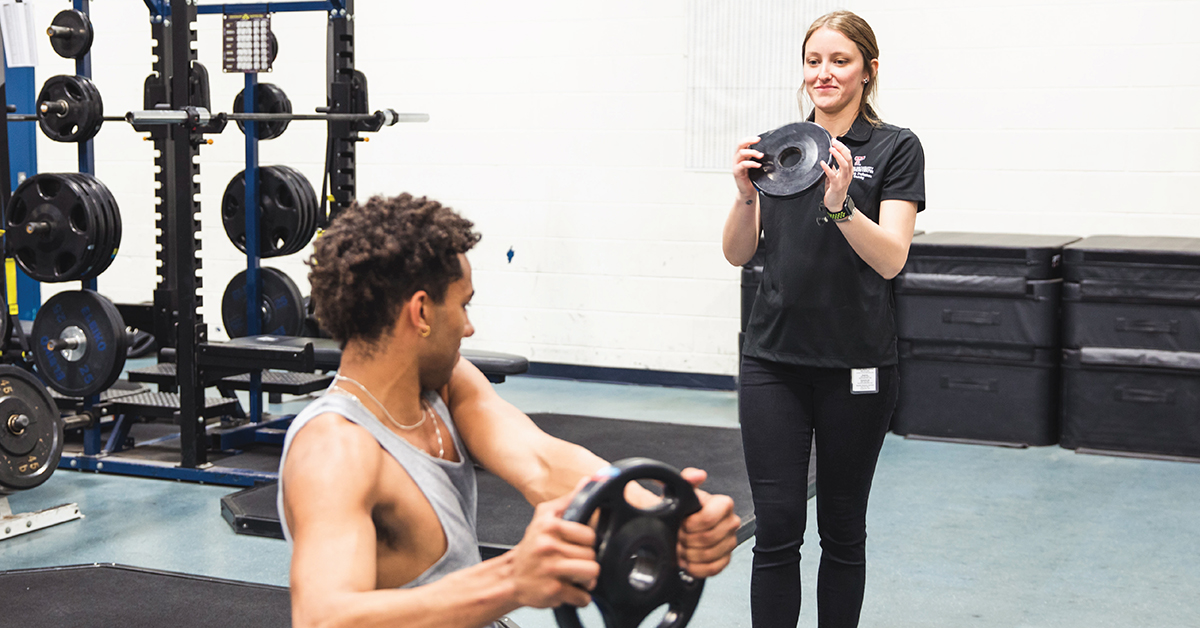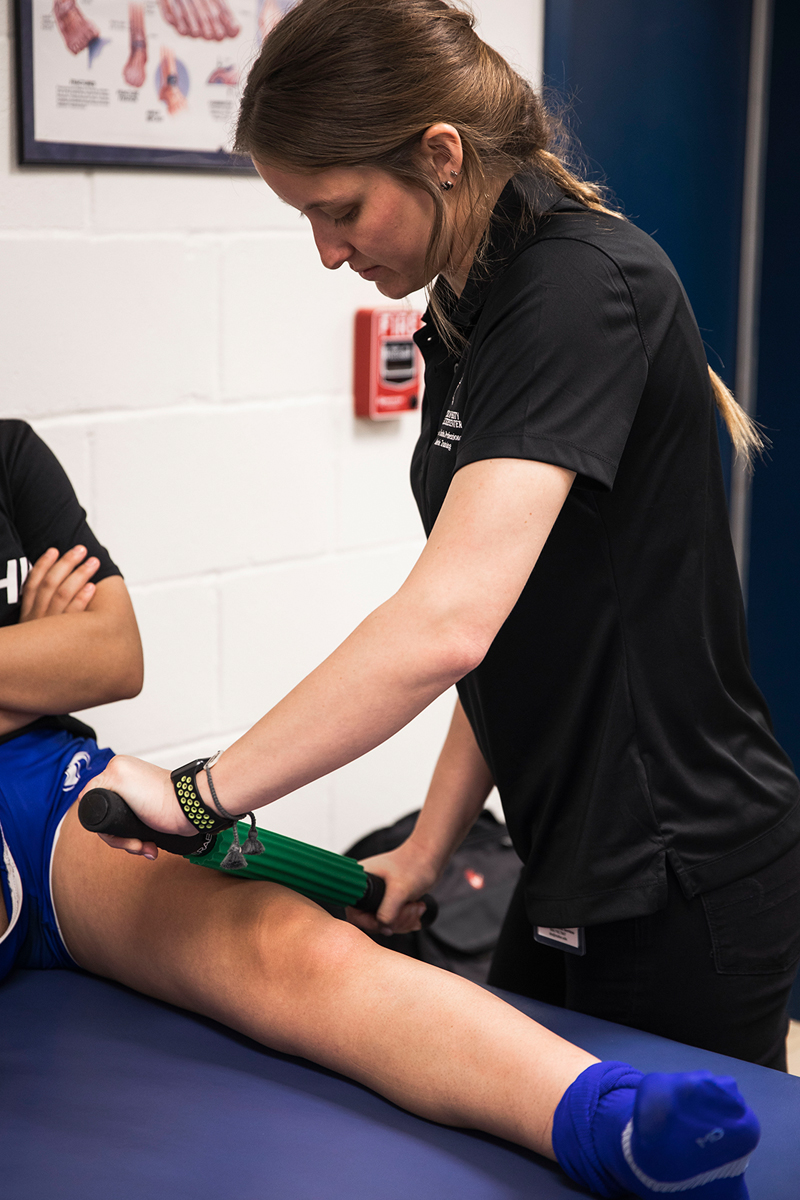Top Skills Needed to Be an Athletic Trainer

The field of athletic training is a lot of things — dynamic, challenging, exciting, and personally fulfilling, to name just a few. At the same time, it’s also a profession that is often misunderstood and sometimes confused with personal training, a job that is, in fact, very different. Personal training requires much less education and focuses on personalized fitness goals, while athletic trainers are a key part of the health care system for athletes and others who must deal with injury prevention, management, and rehabilitation. There are a number of essential skills needed to be an athletic trainer, along with extensive education and training at the bachelor’s and master’s degree levels.
Athletic trainers work directly with physicians, physician assistants, nurses, physical therapists, occupational therapists, strength and conditioning coaches, and other members of the sports medicine and health care teams.
“It’s not just taping and passing out water,” says Larry Munger, assistant professor in the Master of Athletic Training Program at the Texas Tech University Health Sciences Center School of Health Professions (TTUHSC SHP). “Athletic trainers are involved with all aspects of the rehabilitation process and providing complete health care to the athletes and the physically active.”
While the motivation, education, and journey of every athletic trainer is unique, there are a number of skills and traits that it takes to ensure success in the profession. If you’re considering a future in athletic training, the following is a checklist of the top skills needed to be an athletic trainer.
Good Evaluation Skills
Athletic trainers are typically on the front line when it comes to evaluating an injury that has just been sustained and needs to quickly assess the severity of the injury and determine the next course of action. It takes a keen ability to evaluate various factors that may have led to each injury and accurately identify pain generators and root causes to implement optimal treatment strategies. Additionally, excellent evaluation skills are necessary during the rehabilitation process to monitor how the injured tissue is responding and progress appropriately.
Ability to Perform in High-Stress Situations
One thing that every athletic trainer deals with is being called upon in high-pressure situations and environments. This is especially true in emergency situations when the situation may be life- or limb-threatening, and the athlete depends on their expertise and training. Athletic trainers working with professional sports teams and major collegiate programs may have hundreds of thousands of fans watching every move they make when reacting to the emergency.
“When they run out onto the field, it can be a loud and very stressful situation, and they’re dealing with an athlete who’s in some amount of pain,” Munger says. “They need to be able to block everything out and be calm in that situation, which isn’t always easy.”
Excellent Communication Skills
Whether communicating with an athlete who has just sustained an injury, a client during the rehabilitation process, a physician, or any other member of the sports medicine team, it’s critical for athletic trainers to be clear, calm and accurate. They need to be confident in their assessments and able to communicate information to all stakeholders in a way that will provide a better understanding of the athlete’s prognosis moving forward.

Empathy and Compassion
Individuals who sustain an injury that limits them from doing what they usually can do are going through a lot — physically, mentally, and emotionally. The athletic trainer needs to understand this and provide treatment in a way that is compassionate and genuine. Many successful athletic trainers are drawn to the field because of personal experiences they’ve had dealing with injuries — including Munger.
“I was an athlete in high school and sustained a back injury,” Munger says. “It was always my dream to play college basketball, and I did try but I couldn’t because of that injury. So I had to give up my dream. But now I get to be that person who can help others fulfill their dreams by providing the best care possible.”
Patience and Persistence
Many times, the road to recovery from a sports injury is a long one. Athletic trainers need to understand that results don’t happen overnight, and patience is key — and they need to be able to convey that to their patients. One aspect of the field that helps is that athletic trainers generally get to know the athletes with whom they work very well — they know an athlete’s injury history, strengths and weaknesses, and individual personality by virtue of being embedded with a team. Having these solid relationships in place helps an athletic trainer — and patient — navigate what often can be long periods of treatment and rehabilitation.
Interest in Sports
Having an interest in sports is definitely one of the more helpful characteristics of an athletic trainer. Whether it’s a Friday night under the lights at a high school football field, a high-stakes game day at a major college campus, or a showdown between two legendary pro teams, sports have the power to bring people together in ways few other endeavors can.
When you have a love of sports, it’s an amazing experience to be an athletic trainer and an integral part of a team working closely with athletes to help them perform their best.
The Master of Athletic Training Degree Program at TTUHSC-SHP
The master’s in athletic training program at TTUHSC-SHP provides a distinctive path for those who bring the skills it takes to succeed as an athletic trainer.
Housed in the School of Health Professions, the program offers access to exceptional labs and state-of-the-art technology for health care professionals. The program benefits from expert faculty who continue to shape the field of athletic training with their work and research, and who have worked at the highest levels of their profession.
Students in the program can choose from a broad range of clinical training sites throughout Texas and beyond, and they put their skills to the test during an immersive, sixteen-week clinical training experience. Upon graduation, they join one of the country’s most respected networks of alumni who work as athletic trainers everywhere from Texas high schools to the Navy Seals; in professional, collegiate and high school sports at all levels, in rehabilitation clinics and physician offices, and Cirque du Soleil in Las Vegas.
For more information on the TTUHSC-SHP Master of Athletic Training Program, email us at health.professions@ttuhsc.edu, call (806) 743-3220, or visit the program page on our website.
Related Stories
Celebrating Veterans: TTUHSC’s General Martin Clay’s Legacy of Service and Leadership
From his initial enlistment in the Army National Guard 36 years ago to his leadership in military and civilian health care management roles, Major General Martin Clay’s career has been shaped by adaptability, mission focus and service to others.
Texas Tech University Health Sciences Center School of Nursing Named Best Accelerated Bachelor of Science in Nursing Program in Texas
The TTUHSC School of Nursing Accelerated Bachelor of Science in Nursing (BSN) program has been ranked the No. 1 accelerated nursing program in Texas by RegisteredNursing.org.
TTUHSC Names New Regional Dean for the School of Nursing
Louise Rice, DNP, RN, has been named regional dean of the TTUHSC School of Nursing on the Amarillo campus.
Recent Stories
National Academy of Inventors Names TTUHSC Faculty Senior Members
The National Academy of Inventors (NAI) has designated two current and one former TTUHSC faculty researchers as Senior Members.
The John Wayne Cancer Foundation Surgical Oncology Fellowship Program at Texas Tech University Health Sciences Center Announced
TTUHSC is collaborating with the John Wayne Cancer Foundation and has established the Big Cure Endowment, which supports the university’s efforts to reduce cancer incidence and increase survivability of people in rural and underserved areas.
TTUHSC Receives $1 Million Gift from Amarillo National Bank to Expand and Enhance Pediatric Care in the Panhandle
TTUHSC School of Medicine leaders accepted a $1 million philanthropic gift from Amarillo National Bank on Tuesday (Feb. 10), marking a transformational investment in pediatric care for the Texas Panhandle.
